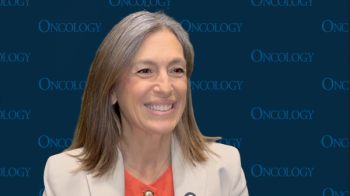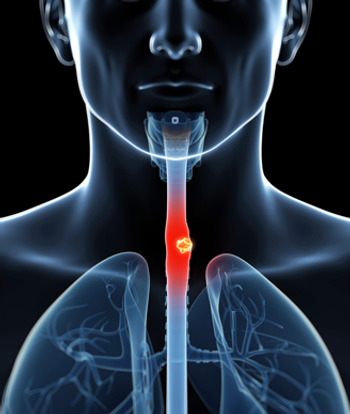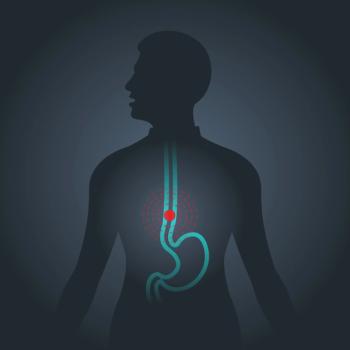
Oncology NEWS International
- Oncology NEWS International Vol 13 No 9
- Volume 13
- Issue 9
In Esophageal Cancer, Promising Trimodality Approach Increases 5-FU Exposure
The 30 reports in this special supplement to Oncology News International represent highlights of ongoing major clinical trials and new research presented at ASCO 2004 regarding state-of-the-art chemotherapeutic management of gastrointestinal and other cancers. Important developments in capecitabine as adjuvant therapy, novel targeted agents, and new combinations are discussed.
LEBANON, New Hampshire-Increased exposure to fluorouracil (5-FU) during radiotherapy, as part of a"trimodality" approach to esophagealcancer, has yielded high resection rates,promising survival, and minimal toxicity,reported Jeffrey A. Bubis, DO,Clinical Instructor in Medicine, NorrisCotton Cancer Center, Dartmouth-Hitchcock Medical Center (abstract4049).Currently, there is no clear standardof care in esophageal cancer. Thetrimodality approach under investigationat Dartmouth involves 25 patientswith stage II/III esophageal carcinomatreated with neoadjuvantchemotherapy, followed by concomitantchemoradiation, and then restagingthat includes surgical resection, ifindicated.Almost 90% of patients had com-plete resection following neoadjuvantchemotherapy followed by concomitantchemoradiotherapy with docetaxel(Taxotere) and capecitabine (Xeloda),Dr. Bubis told ONI. With afollow-up period of 48.8 months, mediansurvival time was 30.42 months,with an overall survival rate of 36.5%,achieved with minimal toxicity in thiscapecitabine dose-ranging trial. "Forpatients, minimal toxicity is really thebest part about this regimen," he said."We only had three patients who requiredfeeding tubes and two patientswho had dysphagia-there were noother dose-limiting toxicities. It wastolerated quite well."Building on Phase I
In 2003, at the International Congressof Anti-Cancer Treatment, inParis, France, Dr. Bubis and colleaguesreported promising phase I data froma study using a neoadjuvant regimenincluding weekly docetaxel and 5-FUwith thoracic irradiation, followed bysurgery in patients with locally advancedesophageal cancer. That phaseI trial served as the foundation for thecurrent trimodality trial.The current trimodality approachis a modification of the original strat-egy, Dr. Bubis said; it represents anattempt to improve the pathologiccomplete response rate (pCR), by increasing5-FU exposure via oralcapecitabine during thoracic radiation.The 25 patients studied (21 male, meanage 64 years) had clinical stage II-IIIcancer of the esophagus and gastroesophagealjunction; this included 23cases of adenocarcinoma and 2 casesof squamous cell carcinoma.Neoadjuvant therapy included docetaxel80 mg/m2 and carboplatinto AUC 6, given intravenously every3 weeks for two cycles. Following that,patients received concomitant chemoradiotherapywith docetaxel 15mg/m2 weekly for five doses, with oralcapecitabine given prior to each irradiationfraction (28 doses). Capecit-abine was given in doses ranging from300 to 2,500 mg total daily dose. Patientswere then restaged using CTscans and endoscopic ultrasound, afterwhich they received transhiatalesophagectomy, if indicated, at 4 to 8weeks after chemoradiation.Good Response Rate
So far, the rate of response afterchemoradiation, for 21 evaluable patients,is 52.4%, Dr. Bubis reported.The pCR rate is 10.5% (2 of 19 patients),while R0 resections have beenachieved in 89.5% (17 of 19 patients).The only dose-limiting toxicity encounteredwas grade 3 dysphagia,which was seen in two patients, andonly three patients needed a feedingtube because of therapy. A total of 12patients had weight gain over thecourse of therapy.While accrual into this trimodalitytrial continues, Dr. Bubis said the resultsto date for are encouraging andmerit further consideration. "It certainlysets a platform on which to basefurther studies. That it has been welltolerated is very promising," he said.The study was funded in part by Aventis,Roche, and a grant from theNational Cancer Institute.
Articles in this issue
Newsletter
Stay up to date on recent advances in the multidisciplinary approach to cancer.



































